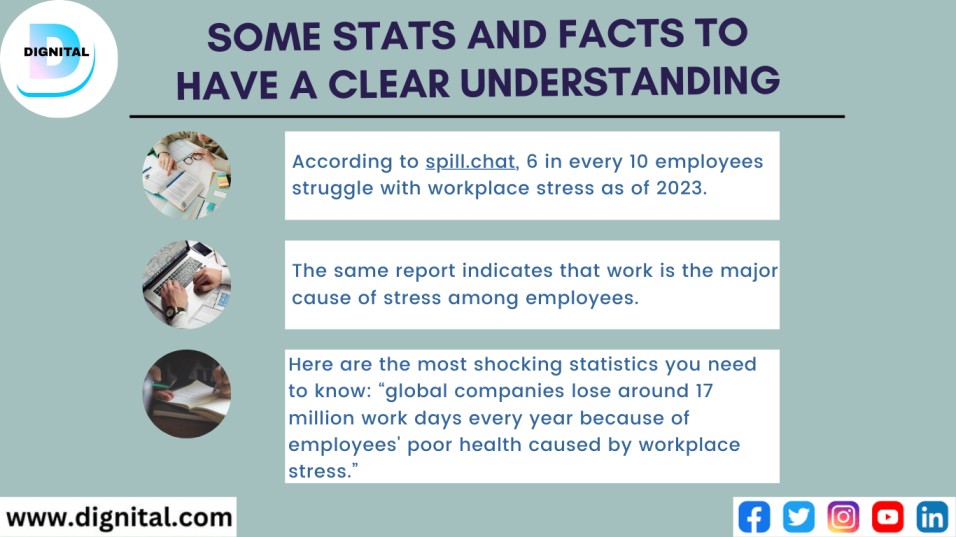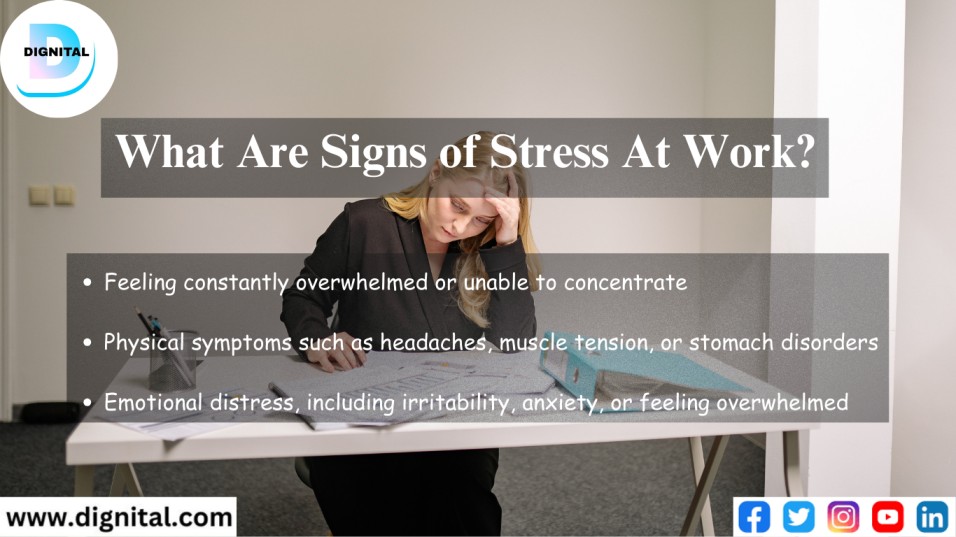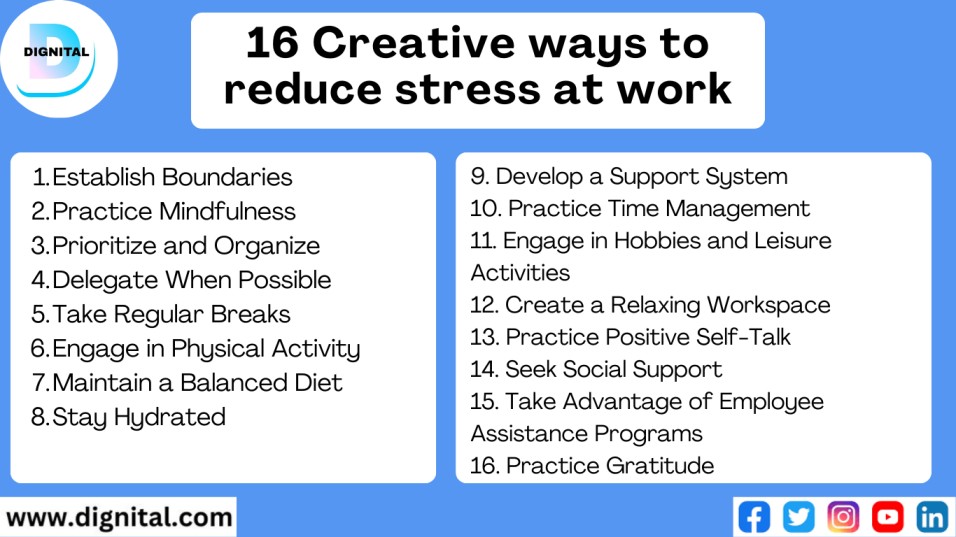The post is inspired from real life instances that happened in my life.

How did you spend your day today at your workplace? Well, it may be good, bad or average. You may be struggling to submit the deadline, your boss might be telling you to not work in this way or you will be helping your colleagues.
After all, a lot of things keep going on at a workplace whether it is corporate setup or any other normal workplace. While your work might be scheduled in advance, it can be changed abruptly any time based on the current scenario in the office.
Any certain thing that you are not ready to take and move on or you resist a change or you are on a tight deadline may lead to mental stress for you. And it is common all around the world in almost every work setup. Now if you think about leaving your job because of work stress, it is not the right solution. Instead, you should learn how to deal with stress at work.
However, the good news is that there are proven strategies on how to deal with work stress and anxiety. In this article, we will explore 16 creative and tried-and-tested ways to ease work stress and achieve a better work-life balance.
Continue reading to learn more with a real life perspective.
Let’s start with some stats and facts to have a clear understanding about how to deal with stress at work

- According to spill.chat, 6 in every 10 employees struggle with workplace stress as of 2023.
- The same report indicates that work is the major cause of stress among employees.
- Here are the most shocking statistics you need to know: “global companies lose around 17 million work days every year because of employees’ poor health caused by workplace stress.” (source)
With the above stats and facts, it is now clear that a lot is happening around the world for workplace stress. To ensure you don’t fall in it or if you are already involved in such things, below is the key.
What are signs of stress at work?

Stress at work can manifest itself in various ways, both physically and emotionally. Before we learn about how to deal with stress at work, it is important to recognize the signs early on to prevent further escalation of stress. Some common signs of work-related stress include:
- Feeling constantly overwhelmed or unable to concentrate: Difficulty in making decisions or organizing thoughts is one of the common thoughts of work stress. After all, if you are unable to concentrate, give your full attention to work, coordinate with colleagues, you may be in work stress. Don’t ignore it if you have these signs.
- Physical symptoms such as headaches, muscle tension, or stomach disorders: Changes in appetite or sleep patterns, increased vulnerability to colds or other illnesses, or not feeling good in terms of health. After all, if someone is in stress, they are unable to eat in the right way. They may experience headache and stomach issues. If you are the one feeling something like that, seek professional help.
- Emotional distress, including irritability, anxiety, or feeling overwhelmed: Loss of motivation or interest in work, Withdrawal from social interactions or isolating oneself. This is another type of sign for work stress. And you can easily relate to these signs. After all, when you reach home after office hours, you may be emotionally stable or you may feel mental irritation. When someone talks to you, you may instantly get angry.
In case of any of these signs of stress at work, you must take immediate action and share things with your family members. If you think you need a break, do it. Share things with your loved ones, perform mindfulness meditation.
Additionally, if medical treatment is required, go for it without a second thought.
After all, if you are stressed because of corporate politics in office, it may be the time to change jobs.
How to deal with work stress? 16 Creative ways to reduce stress at work

How to deal with stress at work requires you practice certain tips. Read below to learn more.
- Establish Boundaries: Set clear boundaries between work and personal life. Avoid taking work-related calls or emails during your off-hours. After all, it is one of the most common reasons for having work stress. You mix your personal and professional life and neither you succeed in managing your family nor office work. Therefore, it becomes vital to leave your family life as you enter the office and leave your job roles as you enter your home.
- Practice Mindfulness: Take a few minutes each day to engage in mindful practices, such as deep breathing exercises, meditation, or yoga, to center yourself and reduce stress levels. By practicing mindfulness, you are able to energize yourself from within and become more powerful to play your job role.
- Prioritize and Organize: Break down tasks into smaller, manageable parts and create a prioritized to-do list. This will help you stay organized and tackle work stress systematically. Further, staying organized and prioritizing things make your mind clutter free that will ultimately make you find stress free. For this, you can organize your office files on the computer, complete any pending tasks, discuss things with your manager or seek any help from your seniors. On the other hand, you must prioritize your tasks based on their deadline and complete accordingly to avoid last minute rush.
- Delegate When Possible: Don’t be afraid to delegate tasks that can be done by others. Sharing the workload not only reduces stress but also promotes teamwork. Further, delegation is a great way to reduce work stress in the office as it makes you free from task surges that others can do.
- Take Regular Breaks: Incorporate short breaks throughout the day to recharge your mind and body. Use this time for a quick walk, stretching, or simply stepping away from your desk to clear your mind. Doing so will help you refresh your mind and start with a new perspective. After all, many people start scrolling their phones during office breaks. That is the worst practice to utilize this time. Using phones steals your attention and interest in work.
- Engage in Physical Activity: Physical exercise has been shown to reduce stress levels and boost mood. Incorporate regular exercise into your routine, whether it’s a morning walk, a lunchtime walk, or an exercise class after work. While it may not be possible to perform exercises during lunch breaks or after work, you can perform different physical activities in the morning everyday.
- Maintain a Balanced Diet: Nourish your body with healthy foods that provide the necessary nutrients to combat stress. Avoid excessive consumption of caffeine, sugar, and processed foods, which can contribute to increased stress levels. Further, maintaining a healthy diet is the key to stress free life whether you are a working professional or not. Choose your food items wisely and be cautious when eating anything.
- Stay Hydrated: Dehydration can exacerbate stress symptoms. Keep a water bottle handy and make a conscious effort to drink enough water throughout the day. It keeps you hydrated, boosting your productivity throughout the day.
- Develop a Support System: Cultivate meaningful relationships with colleagues or friends who can offer support and understanding during stressful times. Talking to someone can provide perspective and help alleviate stress. If you are new to the company, you may hesitate to talk to your colleagues. But it is a good practice to connect with like minded people in your office and share common thoughts with them. But be cautious while sharing anything. Make sure you don’t share anything personal or intimate. Just try to build a healthy professional relationship.
- Practice Time Management: Efficient time management is crucial in reducing work stress. Use time-blocking techniques, set realistic deadlines, and avoid procrastination to stay on top of your tasks. Stop involving in unusual conversions in the office and focus on completing your task on time. Instead of always seeking help, try to first learn and do things on your own.
- Engage in Hobbies and Leisure Activities: Dedicate time to activities you enjoy outside of work. Engaging in hobbies and leisure activities can provide a much-needed break and serve as a positive outlet for stress-reduction. Giving time to your hobbies will make you happy and will ultimately boost your work productivity.
- Create a Relaxing Workspace: Personalize your workspace with calming elements, such as plants, artwork, or soothing colors. A serene environment can contribute to a more relaxed state of mind. After all, if you are working from home, you can easily customize your work area with your desired things. Creating a desired work setup in the office may be quite challenging.
- Practice Positive Self-Talk: If you still wonder how to deal with stress at work, replace negative self-talk with positive affirmations. Remind yourself of your capabilities and accomplishments, boosting your confidence and reducing stress. While positive self-talk helps, always evaluate things based on reality. Instead of consoling your mind with positive words, face the reality and find the real solution to your problem.
- Seek Social Support: If work stress becomes overwhelming, don’t hesitate to seek support from a professional counselor or therapist. They can provide guidance and help develop coping mechanisms tailored to your specific needs.
- Take Advantage of Employee Assistance Programs: Many organizations offer employee assistance programs, providing resources and support for managing stress at work. Familiarize yourself with these programs and utilize them when needed. So, before you join any company, make sure they have an employee assistance program.
- Practice Gratitude: Cultivate a mindset of gratitude by reflecting on the positive aspects of your work and life. Keeping a gratitude journal or expressing gratitude to colleagues can foster positivity and reduce stress. Practicing gratitude gives you peace of mind and keeps you calm at the time of turbulence.
These are some creative ways to reduce stress at work and you can start practicing it from today.
Also read: Things Not To Say When Someone is Struggling With Anxiety Disorders
Should I quit my job due to stress?
Deciding whether to quit your job due to stress is a deeply personal and complex decision. While stress can negatively impact your overall well-being, it’s essential to consider other factors such as financial stability, career prospects, and personal goals.
Before making any rash decisions, it may be beneficial to explore how to deal with stress at work and other strategies to cope with work stress, such as those outlined in this article.
However, if stress persists and significantly affects your health and happiness, it might be worth considering a change in your work environment or seeking professional advice.
Moreover, always keep in mind that your health and peace of mind always comes first. So, don’t delay in changing your job if it is spoiling your health.
In some cases, your family and financial responsibilities can stop you from resigning from the job. And I have experienced the same many times in my life. It may be a tough time making a decision. Here you need to find a way between your health and work.
Final Word
Dealing with stress at work is an ongoing process that requires self-awareness, proactive measures, and a commitment to prioritizing your well-being. By implementing the above 16 creative ways to reduce work stress, you can regain control, improve your work-life balance, and ultimately thrive in your professional endeavors.
Remember, your mental and physical health should remain a top priority, and taking steps to manage stress is a significant investment in your overall happiness and success.
That’s all about how to deal with stress at work.
Comment your beautiful thoughts below on the topic. We would love to hear from you.
FAQs on Reducing Stress at Work
- What are 5 ways to reduce stress?
If you are facing stress at work and want to reduce it, you should try these five tips:
- Practice deep breathing.
- Use guided meditation.
- Manage social media time.
- Connect with others.
- Do exercise and get good nutrition.
- How can you reduce stress in 2 minutes?
There is a common relaxation technique called the 4-7-8 breathing exercise. You will have to inhale for 4 seconds, hold the breath for 7 seconds, and then exhale the breath for 8 seconds. You need to repeat this breathing exercise at least 3 times when you feel stressed, or you can do as many times as you wish.
- What are the signs and symptoms of stress?
Stress impacts our emotions, health, and behavior in many ways. There are a lot of signs and symptoms of stress, such as depression, inability to enjoy yourself, not interested in life, a sense of dread, and loss of sense of humor. When you notice any sign, seek professional help.
- How can you manage stress during a busy day?
You can manage stress during a busy workday through deep breathing exercises, taking short breaks to nap or walk, prioritizing tasks, and time management. You should also consider setting limits, giving lessons to other people if possible, and practicing mindfulness to stay focused and reduce anxiety.
- What role does a healthy work-life balance play in reducing work-related stress?
It’s essential to balance your work and personal life to reduce stress from work. It allows you to rest when you are not at work, spend time on your hobbies, and have quality time with your loved ones. You should set limits for when you finish working and start your time to avoid becoming overwhelmed and exhausted.